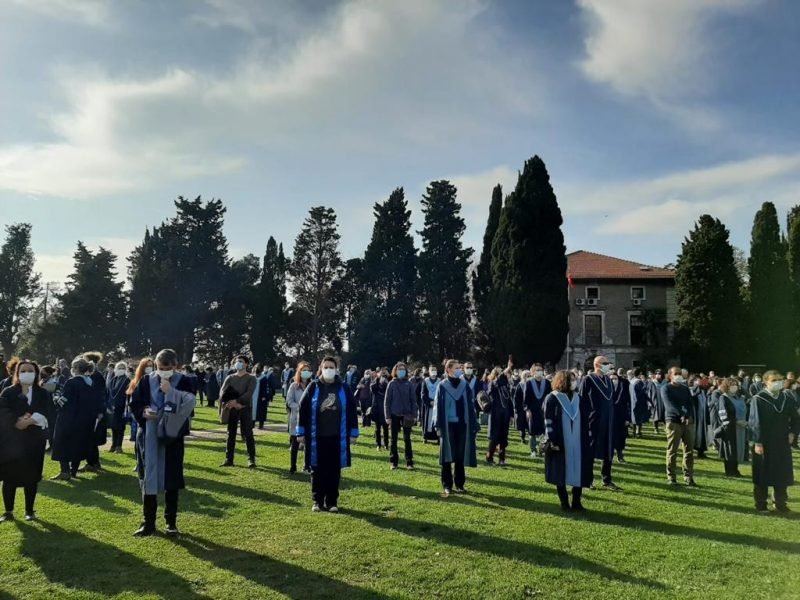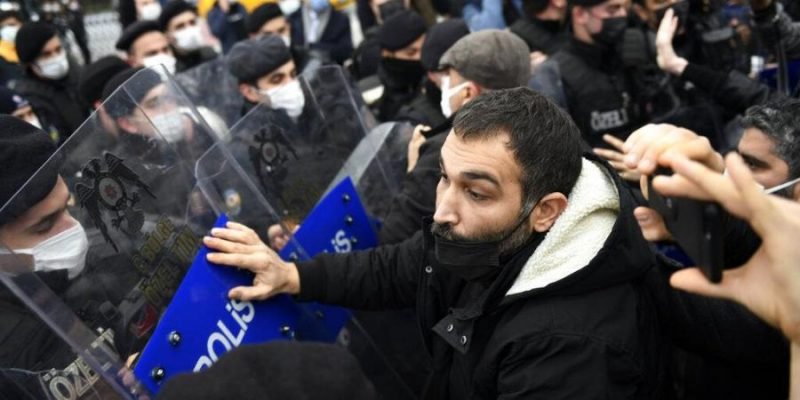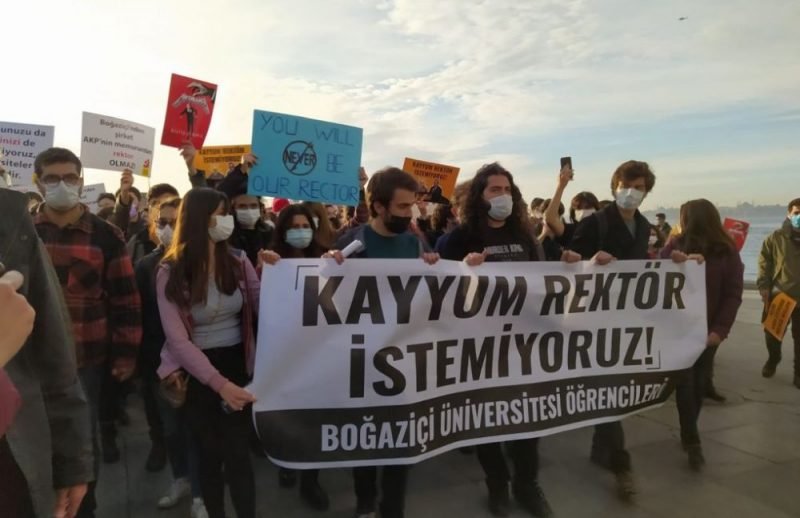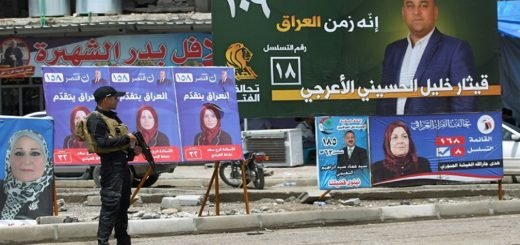An Interview with Zeynep Kurbanzade: Decoding protests in Turkey

Protests have been going on at Boğaziçi University in İstanbul, Turkey over the appointment of Melih Bulu as the rector. The protesters are resisting this appointment by calling it politicization of education since Bulu was appointed through a presidential decree.
To know more about this issue, Niranjan Marjani, Consulting Editor of The Kootneeti Español, spoke to Zeynep Kurbanzade, 19, a freshman student in the Political Science and International Relations Department at Boğaziçi University.

Niranjan Marjani: What is the background of the protests that have been going on at Boğaziçi University?
Zeynep Kurbanzade: These protests began on 4th of January, when a new rector was appointed by a presidential decree on 1st of January. There are unacceptable features, which brought us together in the campus or outside, everyday (except for weekend curfew). In the first place, an antidemocratic appointment is what we protest regardless of Melih Bulu’s identity. Boğaziçi is one of the best universities in the country, which has 158 years of history including many artists, businessmen and statesmen. We have concerns about this political and antidemocratic appointment, which is likely to harm our university and academic independence in whole Turkey.
Everyday our academicians start protesting with turning their back to rector’s office and then students continue in creative ways, like concerts and exhibitions. We end up every day, standing behind the gates with reading a press release, across an army of police blocking the media and video-shooting our face.
NM: Has the government given any response to the protests? If so, what was it?
ZK: I can frankly say that one of the few responses was a disproportionate use of police force on us. Even though, protesting is a constitutional right whether you get permission or not, police have arrested many students and other supporters before the protests began. When our friends were heading to Kadıköy (district on the Asian side) police detained the ID cards on buses and ferry to check if they were studying at Boğaziçi or not. The ones who were students got arrested arbitrarily or blocked to use public transport. Government justifies these prohibitions with pandemics but this obviously does not explain the brutal police force. At the same time, when the radical Islamists held counter-protest after a presentation of an art piece in our exhibition, police just watched them. On the same day, we were locked in the campus for hours and outside of the campus was horrifying. There were at least 7-8 water cannon trucks, countless policemen and sharp shooters on the ceilings. In Turkey, we have witnessed murderers getting released without punishment or rapers welcomed honorably but this brutal treatment to us, who do not give concession about the peaceful principles, is brutal and political. Next to the police force, the statesmen called the students “terrorists” to distort the case which we rightfully demand democracy. Where can you see a president and interior minister who declares the students as terrorists?
NM: Is this the first time that there has been a ‘political appointee’ to the post of rector? How is this position filled otherwise?
ZK: Normally, rectors are elected within a process in which the university constituents are included. The elected rector’s name is presented to the president and he/she signs it symbolically. But in this case, an outsider was directly appointed, which is totally anti-democratic and against the autonomy of the university. This issue has been our prior objection since the day one. Next to this fact, he has an active but failed political background in AKP and committed to plagiarism, expressed sexist rhetoric, worked in academically lower universities. So it is unacceptable in many ways. He claims that what we say to him is also said to the state. Today the state and the government overlap abnormally, which politicizes and polarizes everything. But the universities should be independent from politics, unlike what he understands from the word “university.”
The previous rector, Mehmet Özkan, was appointed as well but it was not intensely political like this. There were protests against him as well but his presence seemed more acceptable since he was a scholar in our university. After a while, the academicians made him abide by the university principles that have to be protected during his period. Even though an appointment is against these principles in the first place, they reached a compromise and it nearly worked.

NM: Is it the element of politicization that the protesters are opposing or is there an element of radicalization as well in this entire issue?
ZK: Of course politicization is a very important factor when we consider that politicization leads to polarization in Turkey today. Students protesting against an appointment are declared to be terrorists. This is irrationally radical framing of students, which were named to be the “future of the country” before the protests. We try to read the comments on this issue and in some of them, we see that radicalized and polarized ideas, views shape these comments; not rightness, consciousness of democracy or rationality.
NM: At the time when the Turkish President Recep Tayyip Erdoğan is said to be losing public support especially among the young voters, wouldn’t this step further alienate the youngsters from him and his Justice and Development Party?
ZK: We are the generation who grew up with Justice and Development Party (AKP) and we have witnessed its steps one by one. When we look generally, growing up with technological opportunities, this generation tends to be more open minded rather than being attached to an ideology or a party. At the same time, worsening life standards push this open minded generation to be more pragmatists even if their parents support a party radically. I have heard some friends have been secretly supporting these protests because of some attached views of their family members.
This police force and government’s discriminating rhetoric disturbed many people especially the young generation. High schools and universities released manifests supporting our demands and defending our rights, all around Turkey.
NM: Turkish economy has suffered in the past few months with increasing inflation and devaluation of lira. Although some of the problems could be attributed to COVID-19, how much bearing does Turkey’s geopolitical maneuvering in the neighbourhood have on the economic situation?
ZK: In recent years, Turkey has been displaying an aggressive foreign policy in the region, significantly shaped by internal issues and policies. From Boğaziçi protests to East Mediterranean conflict, there is rhetoric focused on what is “local and national”. Any internal or foreign issue is being justified by this aim to become more local and national. The necessity or rationality of the steps taken in the region is not considered and aggressive steps harm the rightness of Turkey in these cases. For example look at the East Mediterranean conflict, Turkey is an isolated actor in such a vital case which it should have secured more prestigious seat. It is confined to use military deterrence to defend an island just 4 km away from the mainland. Diplomacy and peaceful principles do not satisfy its internal image and need of support. Both in the foreign and internal policies, we witness the same problems of regime: aggressiveness and the use of military/police deterrence. These factors limit the maneuvering capacity of Turkey in the region.

NM: Are there any chances of change in the leadership in Turkey or a change in the regime?
ZK: Change in leadership should be an inherent outcome of problems. Long years of ruling and authoritarian inclinations of the government, renders it abnormal. People might want government to change but there is a little belief that it might happen in peace. We witness a government, which sees compromising with us as a concession and like every authoritarian government, they would never give a concession. During the protests, many students were threatened from social media and the counter-protest groups wrote on social media that they were ready to “cut our heads.” When we consider that all we want is democratic elections in our university against a political appointment, this reaction seems to be too much and encouraged. So first of all, there should be a belief in change, people should be able to speak about their political views freely because we have some problems which can be solved with a change in leadership. We need an active, reconciler and moderate government, not regarded as a “father”.
NM: Thank you very much for talking to The Kootneeti.
ZK: You’re welcome.



















